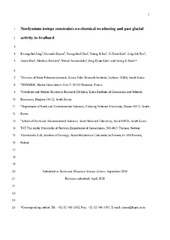Blar i forfatter "Bayon, Germain"
-
Glacial and environmental changes in northern Svalbard over the last 16.3 ka inferred from neodymium isotopes
Jang, Kwangchul; Ahn, Youngkyu; Joe, Young Jin; Braun, Carmen; Joo, Young Ji; Kim, Jung-Hyun; Bayon, Germain; Forwick, Matthias; Vogt, Christoph; Nam, Seung-Il (Journal article; Tidsskriftartikkel; Peer reviewed, 2021-04-05)The reconstruction of past ice sheet extents and dynamics in polar regions is essential for understanding the global climate system and obtaining more reliable predictions of future climate change. Here, we present a multi-proxy dataset integrating the Nd isotopic compositions (εNd) of paired detrital and authigenic Fe oxide fractions, grain size distributions, organic geochemistry, and mineral ... -
Neodymium isotope constraints on chemical weathering and past glacial activity in Svalbard
Jang, Kwangchul; Bayon, Germain; Han, Yeongcheol; Joo, Young Ji; Kim, Ji-Hoon; Ryu, Jong-Sik; Woo, Jusun; Forwick, Matthias; Szczuciński, Witold; Kim, Jung-Hyun; Nam, Seung-Il (Journal article; Tidsskriftartikkel; Peer reviewed, 2020-05-15)<p>Neodymium (Nd) isotopes in leached authigenic components of marine sediments have been increasingly used as a tracer of past ocean-water masses. Despite the general assumption that the Nd isotopic composition of solutes released during chemical weathering fingerprints the source rocks on continents, preferential dissolution of easily dissolvable phases may result in significant deviations in Nd ... -
Non-linear response of glacier melting to Holocene warming in Svalbard recorded by sedimentary iron (oxyhydr)oxides
Jang, Kwangchul; Bayon, Germain; Vogt, Christoph; Forwick, Matthias; Ahn, Youngkyu; Kim, Jung-Hyun; Nam, Seung-Il (Journal article; Tidsskriftartikkel; Peer reviewed, 2023-03-01)The recent acceleration of ice-sheet loss with its direct impact on sea-level rise and coastal ecosystems is of major environmental and societal concern. However, the effect of atmospheric temperature increases on long-term glacier retreat remains poorly defined due to limited historical observations and uncertainties in numerical ice-sheet models, which challenges climate change adaptation planning. ...


 English
English norsk
norsk

